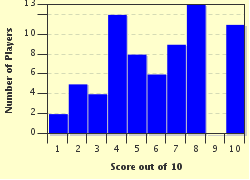Quiz Answer Key and Fun Facts
1. She laughed (Ha Ha Ha), he stabbed her
2. Mama, he just killed a man
3. She shot the school principal and the janitor
4. Supposedly inspired by the character Norman Bates
5. He murders his children
6. He builds a cage with his victim's bones
7. He used a chrome plated tool from the shed
8. He caught her messin' 'round with another man
9. He shot a man just to watch him die
10. He shot the deputy
Source: Author
pollucci19
This quiz was reviewed by FunTrivia editor
agony before going online.
Any errors found in FunTrivia content are routinely corrected through our feedback system.

